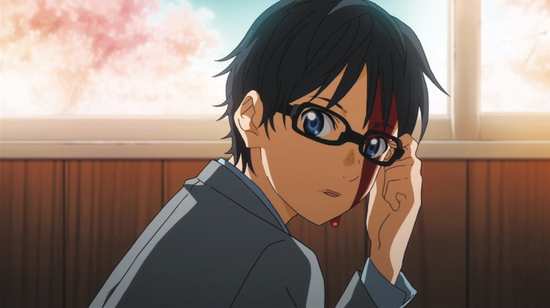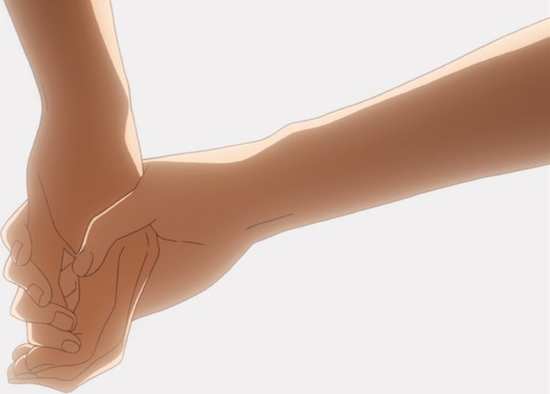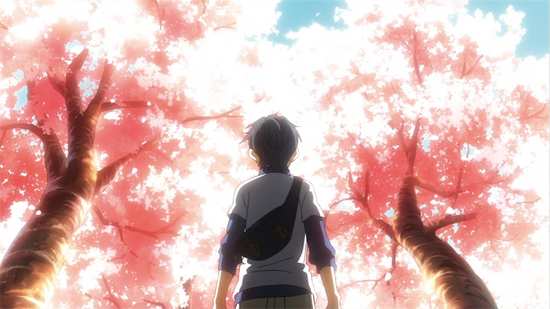Review for Your Lie in April - Part 1 Collector's Edition
Introduction
There’s a term used in anime, ‘Sakuga’ which refers to moments in a show or a movie where the quality of the animation drastically improves, the budget goes up, the man hours put in increase, all to make the moment more dramatic, to combine the visual aesthetic with the emotional content of the scene, to make a lasting and indelible impression on the viewer. If you want to be crude, you could call it the money shot. But fans of the practice actively seek it out, comment on those moments in shows where the animators really push the boat out. But what do you call it when a whole show is sakuga, when every moment on screen is lush, vivid and emotionally arresting? You’re going to have to redefine your terms. Enter Your Lie in April, which might just be the most beautiful anime I have yet seen.
Kousei was a virtuoso pianist, a veritable child prodigy, who enthralled in competition, and was tipped to go on to great things. Then at age eleven, his mother died. She was the one who had driven him to aspire to perfection as a pianist, and for whom he was determined to succeed. Since then, his world has been monochrome, and he’s been unable to play the piano. Then three years later, his childhood friend Tsubaki introduces him to her classmate Kaori. She’s a violinist, but her free spirit and passion for music is a far cry from the regimented perfection that he had once aspired to. She challenges him in everything, even persuades him to play the piano again, but she also brings the colour back into his world...
The first eleven episodes of twenty-two are presented on two Blu-rays from All the Anime.
Disc 1
1. Monotone/Colorful
2. Friend A
3. Inside Spring
4. The Journey
5. Cloudy Skies
Disc 2
6. On the Way Home
7. The Shadow Whispers
8. Let it Ring
9. Resonance
10. The Scenery I Shared With You
11. Light of Life
Picture
Your Lie in April gets a 1.78:1 widescreen 1080p transfer, and it is impeccable to my eyes. Certainly I see no problem with compression or other digital artefacts, and even banding is completely absent. The image is clear and pin sharp throughout, the animation looks divine in high definition, and the show’s rich and vivid colour scheme is consistently reproduced. It’s a great animation too, with appealing character designs, and a lush and effective world design, and a whole lot of thought, time and effort put into the character animation. This is one show where the emotions and motivations of the characters come through in subtle ways as well as the more obvious. Then there is the music animation, which is better even than that in Kids on the Slope, which itself was no slouch in the department, rotoscoping musicians for its sequences.
The images in this review were kindly supplied by All the Anime.
Sound
You have the choice between PCM 2.0 Stereo Japanese and English, with optional translated subtitles and a signs only track. I was perfectly happy with the original Japanese audio, but what I sampled of the English dub was pleasant enough, with no one seeming particularly miscast, and the translation flowing well and sounding natural. With this such a music oriented show, you definitely need a good audio track, and uncompressed stereo is as good as it gets, really bringing the best out of the classical music that you’ll hear in the show. The subtitles are timed accurately, and free of typos, although maybe another go at proofreading might have helped, as I did see indefinite articles go missing on occasion. A couple of things which aren’t subtitled at all are the theme songs, which is a shame.
Extras
The discs present their content with animated menus. The sole extras are on disc 1, and comprise the textless credit sequences, and a useful commentary on episode 1, featuring ADR Director Patrick Seitz, Max Mittelman (Kousei), Erica Lindbeck (Kaori), Erica Mendez (Tsubaki), and Kyle McCarley (Watari).
This is a Collector’s Edition release, but I’ve only seen the check discs, so I cannot comment on the packaging or any physical extras.
Conclusion
I have a new favourite anime! There comes a point where that phrase loses its impact, and given that Your Lie in April joins a list of around 119 favourite anime in my possession (I have a lot of anime), you’ll understandably ask just what makes this show so special. Well, it’s a great slice of life teen drama for one thing, with appealing characters and a stupendously engaging story. The second thing is that it effectively melds music into its plot. Music alone can engage the emotions, but in conjunction with a decent story, the effect is multiplied. You won’t be surprised to hear that shows like Beck, Sound of the Sky, Kids on the Slope and K-On! reside among that list of favourites. Here the music genre of choice is classical music, which presented with this show’s fabulous animation is utterly breathtaking.
The story is accomplished with panache, and really compelling. We first meet Kousei Arima, a virtuoso pianist who’s given up playing the piano, and it quickly becomes clear that it’s a traumatic decision for him. He makes pocket change transcribing music, and he still has a piano in his house, in a dust filled and abandoned room. It turns out that he was a technically perfect pianist, trained by his mother to excel in competition, but when his ailing mother passed away, he actually lost the ability to hear the music that he played. Since then, his world has been at something of a standstill, he’s just been going through the motions, although he does have the support of good friends, his best friend Ryota Watari, and his childhood friend and next door neighbour Tsubaki Sawabe.
His life changes the day that Tsubaki sets up Watari on a date with her classmate Kaori Miyazono, and invites Kousei along as a fourth on the double date, Friend A in other words. Kaori is a violinist, and she’s the exact antithesis of what Kousei was, a free-spirited and unconventional violinist who loves making music. After a questionable first impression, she actually manages to get Kousei playing the piano again, despite his handicap, and even persuades him to take part in a competition. Slowly, but surely, and despite his personal issues, Kaori is instrumental in bringing Kousei back to life.
If you listen to the audio commentary on the first episode, you’ll no doubt hear the warning to prepare for tears, as Your Lie in April is a bittersweet story. There are certainly emotional moments aplenty in this first half of the series, although most of them are of the joyful uplifting kind. But there are two types of emotion at play in this series, and if I do have a bone to pick, it’s with one of them, the grand operatic emotions of narrative foreshadowing. The comparatively more subtle of these is the story of Kousei and his mother, told mostly in flashback, an explanation of just why he can’t hear his own music. I say comparatively as it’s still punctuated with bullet-points, the overbearing mother, the transference of ambition, the psychological pressure and abuse, and the inevitable reaction, the guilt that ensues.
The second arc is Kaori’s story, which is done with the narrative subtlety of a Key Arts adaptation, a wholly manipulative foreshadowing of just how dark and painful this story will probably get. Kaori collapses in one episode, she has a lengthy hospital stay in another, she’s seen taking a cocktail of prescription drugs in yet another. This anime is making sure that you know this won’t end well. That’s the histrionic soap opera aspect of the show that might be its one Achilles heel. But there is the other type of emotion which is wholly successful.
It’s the truly subtle interplay of emotion, carried off by that wonderful animation. Great music is one thing, but you also have to show the audience reacting to that music, and Your Lie in April is masterful at that. Then there is the interpersonal dynamics of the show. Watari is something of a player, but Kousei accepts that Kaori is his girlfriend, despite the fact that he’s quick to develop feelings for her himself, convincing himself that it’s gratitude for her bringing colour into his life again and nothing more. At the same time Tsubaki’s sisterly protectiveness of Kousei masks deeper feelings as well, and Your Lie in April succeeds in conveying all this mostly through subtext, not requiring soapy melodrama at all.
So while I’m tempted to mark the show down for its occasional narrative heavy-handedness, I can’t help but give it full marks for its exquisite blend of subtle emotion, divine music, and gorgeous visuals. If that isn’t enough, Kaori quotes from Peanuts. This show can do no wrong! Part 2 now please...









Your Opinions and Comments
Be the first to post a comment!